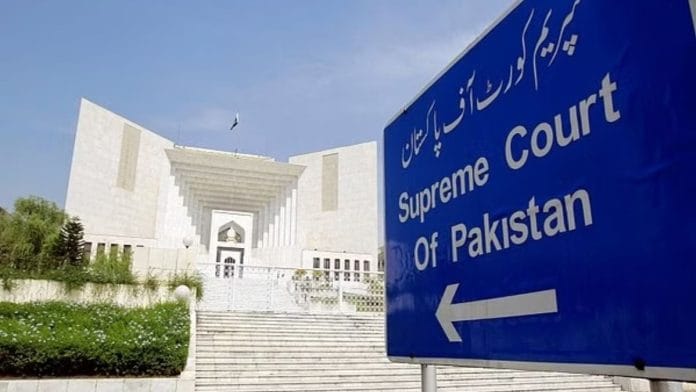New Delhi: A Pakistan Supreme Court ruling on the rights of Ahmadiyyas in the country has ignited widespread protests and deepened tensions between religious hardliners and the judiciary.
The February ruling has been witnessing protests since then and has undergone three changes in judgments. Demonstrations taken out Monday demand a final withdrawal of the verdict before 7 September. If it fails to do so, there will be “no peace in Islamabad”, a protester warned.
The country has seen a deadlock between religious groups and its judiciary over the 2023 Mubarak Sani case, in which the top court allowed the persecuted Ahmadiyyas to practise their faith.
Pakistan has the world’s largest Ahmadiyya population. It is also the only community in the country that is denied voting rights and is not recognised as Muslim.
What is the Mubarak Sani case?
The controversy began with a landmark decision on 6 February, when the Pakistan Supreme Court ordered the release of Mubarak Ahmad Sani, an Ahmadiyya who was arrested last year for distributing the Tafseer-i-Sagheer, a shorter version of the Tafseer-i-Kabeer—a 10-volume exegesis of the Quran by Mirza Basheer-ud-Din Mahmood Ahmad, son of the founder of the Ahmadiyya sect.
Sani was accused of violating a 2021 Punjab law that prohibits the printing and distribution of “heterodox” Quranic commentaries. However, Sani argued that he distributed the text in 2019 before the law was enacted. Chief Justice of Pakistan Qazi Faez Isa ruled in his favour, citing the principle that criminal laws cannot be applied retroactively.
Initially unnoticed, the ruling gained widespread attention after being highlighted by social media accounts linked to the Tehreek-e-Labbaik Pakistan (TLP), notorious for its violent anti-blasphemy protests.
The CJP’s decision has sparked mixed reactions across Pakistan. Legal experts praised it as a small but significant step toward religious liberty, particularly for Ahmadiyyas, who rarely win legal cases in the country.
However, the Ahmadiyya community viewed the ruling as limited, as it did not affirm their right to distribute religious texts. On the other hand, radical Sunni groups reacted with outrage, accusing Chief Justice Isa of siding with the Ahmadiyyas.
On 23 February, thousands of Pakistanis protested against Chief Justice Isa in response to the ruling, which they perceived as related to blasphemy. The Supreme Court then issued a statement defending Justice Isa’s ruling, clarifying that it did not violate Pakistan’s Islamic constitution and condemning the “unfortunate” campaign against the judiciary.
Amid the escalating controversy, the Punjab government filed a review petition. Several religious parties also filed petitions, but the court limited their right to a hearing, focusing on constitutional and Islamic law arguments. The top court also issued notices to 10 religious institutions, including the Council of Islamic Ideology (CII), seeking their guidance on Islamic jurisprudence.
Also read:
No place for freedom of religion
What followed was a rare move— a re-examination of the verdict by a three-judge bench, including Chief Justice Isa, on 24 July. The Justices clarified that their decision was based solely on the issue of retroactivity and reaffirmed that Ahmadiyyas still cannot identify as Muslims or propagate their beliefs outside their places of worship.
However, this clarification did little to appease radical Sunni groups or the CII, a constitutional advisory body. The CII criticised the ruling for allowing Ahmadiyyas to profess their faith within their places of worship, arguing that they should be prohibited from doing so even in private settings.
The CII’s stance, calling for further persecution of Ahmadiyyas, ironically coincided with Pakistan Minorities Day on 11 August 2024, when President Asif Ali Zardari reaffirmed the country’s commitment to protecting minority rights.
Now, the Punjab government has once more filed a petition challenging the court’s conclusions, arguing they were based on erroneous assumptions. The court is set to hear the petition on 22 August on an ‘urgent’ basis.
However, on Monday, workers from various religious organisations – including Jamiat Ulema-e-Islam (JUI) and Jamaat-e-Islami (JI) – protested against the Supreme Court’s decision in the Mubarak Sani case under the banner of Majlis-e-Tahaffuz-e-Khatme Nabuwwat, asking the court to withdraw it completely. Visuals across social media showed protesters trying to enter the Judges Gate of the Supreme Court, despite police efforts to stop them using tear gas. Cops also used baton charges and water cannons to disperse the crowd, but the protesters eventually reached the Parliament House and the Supreme Court building.
Also read:
Ahmadiyya persecution in Pakistan
Two to five million Ahmadiyyas live in the country and face significant persecution and discrimination. They are legally barred from worshipping in non-Ahmadiyya mosques, using Islamic greetings, quoting the Quran publicly, and producing or disseminating religious materials. Violating these restrictions can result in imprisonment.
The community is barred from voting unless they renounce their faith or are listed as “non-Muslims” on electoral rolls, which contradicts their beliefs. The community boycotted the 2024 general elections to protest ongoing persecution, including grave desecrations in Punjab.
Additionally, Ahamdiyyas must declare themselves non-Muslim to obtain a passport or a national ID card.
These laws have led to widespread persecution of the community, with Ahmadiyyas frequently targeted in hate-related incidents. Religious seminaries across Pakistan include materials specifically designed to refute Ahmadiyya beliefs, further entrenching the discriminatory sentiment against them.






